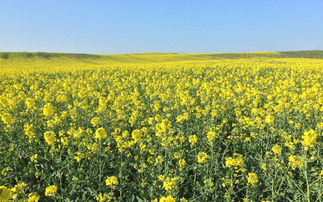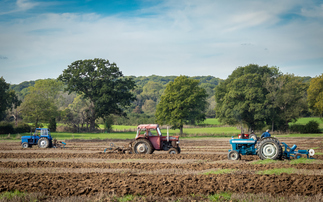Aida Greenbury of Asia Pulp and Paper explains how bottom line performance and sustainable forests can be combined to help deliver 'a green economy for Indonesia'
Few companies have seen their green reputation undergo a more dramatic transformation than that experienced in recent years by Asia Pulp and Paper (APP). For years the Indonesia-based paper giant was a bête noire of environmental campaigners and was repeatedly targeted by high-profile protests designed to highlight the connection between the company's blue-chip clients and the rainforest destruction that cleared the way for APP's plantations.
Then, in early 2013, something remarkable and largely unprecedented happened. The company announced it would bring an immediate halt to deforestation, and what is more it would work with its former foes at Greenpeace to ensure the new zero deforestation policy was fully enacted.
This Thursday at 3pm UK time BusinessGreen will host a Twitter debate with APP's Managing Director for Sustainability and Stakeholder Engagement, Aida Greenbury, and representatives of Greenpeace and The Forest Trust to explore how zero deforestation can become a reality for many more businesses.
We're inviting BusinessGreen readers to take part in the debate and put forward their questions, but ahead of the Twitter session we sat down with Greenbury to explore how the company underwent such a significant transition and how green credentials are helping to improve business performance.
BusinessGreen: Can you explain what prompted the decision to announce a zero deforestation policy?
Aida Greenbury: It was due to pressure from all directions - pressure from NGOs, pressure from customers, pressure internally from the shareholders and board of directors who wanted to know why sales dropped, and pressure from the sustainability team I lead.
We felt at the time we had been dancing round the issue. We had this pressure over a few years and we decided we had to do something about it. That was why we launched our sustainability roadmap in 2012, but when we launched it right away it was criticised by Greenpeace who said it was not rigid enough and not strong enough as it only included half our supply chain.
That was when we realised, ‘Oh my God, we actually have to include the whole aspect of the supply chain in this commitment'. It took six months to take these ideas to the wider members of the supply chain so that they could support us. We finally received the commitment from the wider supply chain by January 2013 that they would stop all bulldozers and chain saws by January 31st. We then made the announcement on February 5th that we would include all aspects of our supply chain in Indonesia and globally.
Was there much resistance to the new strategy? And if so, how did you overcome it?
There is a soft approach and also a hard approach. The soft approach is to convince them [suppliers and contractors] this is the right thing to do and that we will support them, with human resources and financial resources as much as we could. But the hard approach is ‘if you don't do this we will have to disengage you as suppliers'.
Did you actually drop suppliers as a result?
There was one who despite whatever approach we took said no, and we had to disengage them unfortunately. They stood out because everyone else had agreed. But there was this one supplier doing some dirty deals with the Malaysian market and still converting natural forest. They refused to stop as they were still providing the Malaysian company with natural fibre. Well, you know, we can't do that and we gave them notice if they didn't change in one month we would disengage - and we had to do it.
How do you enforce such a commitment?
With blood and tears. It is definitely not easy. It was not easy in the past, it is not easy now, and it won't be easy in the future. We have transformed the way we do business here. We are changing the mentality of suppliers and contractors. Most of our contractors had the mentality to cut everything, the mentality of loggers as we call it. They did not even think about sustainability. Educating internal contractors and suppliers was the most difficult aspect of the transformation. We had to do a lot of training and capacity building and we have to keep doing that. We have to repeat the same message over and over again.
And still there must be fears that some people could be cheating.
I will not be able to guarantee that there is nobody cheating - it is human nature to cheat sometimes. We cannot guarantee, that is why we are relying a lot on the independent monitoring from The Forest Trust and the wider NGO community. I had so many meetings with the NGOs, particularly the local NGOs in Indonesia, who would say ‘there is something dodgy going on' and then we can get the evidence and look at it. Without this independent monitoring from the NGOs we would not be where we are now. We are now in a position where we can look into any reports [of logging] within 24 hours.
Do you invite customers to also get involved in that auditing and enforcement?
Yes. But there are two types of customers. Customers who genuinely have a similar vision to us based on ending deforestation, fair trade, and creating sustainable products for the market. But there are also some customers who are trying to look at where we may do wrong to protect their own market. We assess what type of customers they are, and if they are genuinely trying to help us - I can name a few, like Staples and Nestlé who are genuinely sharing our vision in ending deforestation - then we invite them to go as deep as they want to into the forest. They do their own checks, they appoint their own auditors, they are not relying on our auditors.
Your work with NGOs that were formerly very critical of the company must have created some challenges. What advice would you have for businesses looking to work with the green NGO community?
The most important and the most difficult part in engaging with NGOs is how to build trust between us. The only way to build trust is to open up and agree on the vision and the objectives. We had to agree on the shared objectives and then the only way to build trust is to bring them into the operation and be as transparent as possible. They may accuse you of so many things, but if you show them transparency, if you open up your doors, open up your mill gates and show them ‘look, this is what we've got, we're not hiding anything', then slowly trust will be built.
On reflection do you think the NGOs ultimately played a positive role in helping the company change?
Absolutely. Through their campaigns they opened our eyes to certain areas and issues we were not aware of before. For example, what is the definition of deforestation? We were not aware of high carbon stock or the necessity of a clear definition of deforestation. They were very helpful with that.









